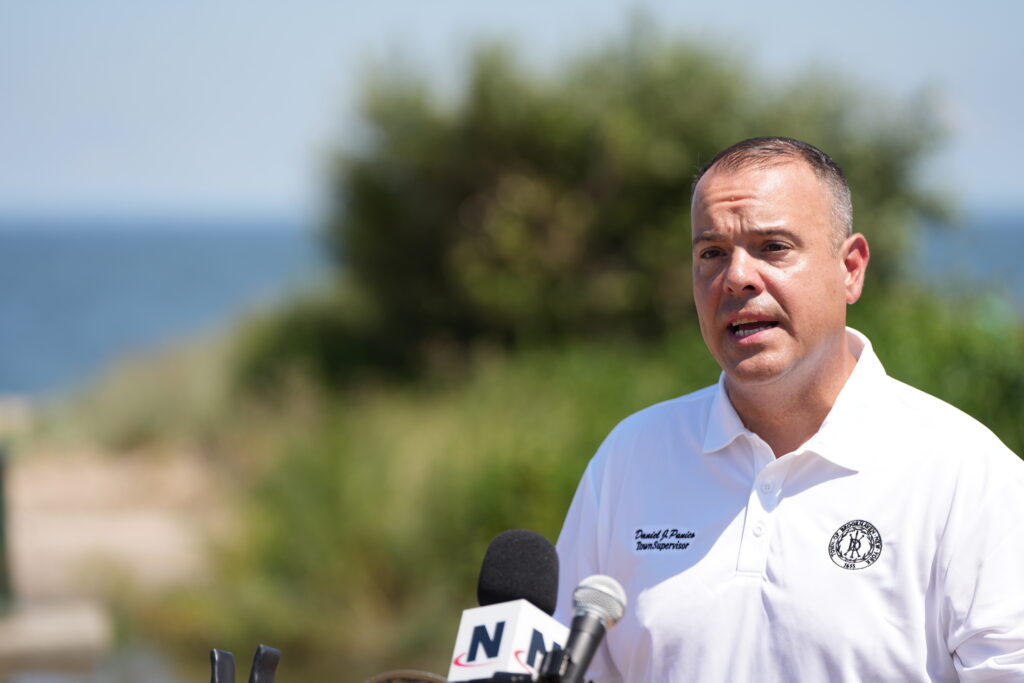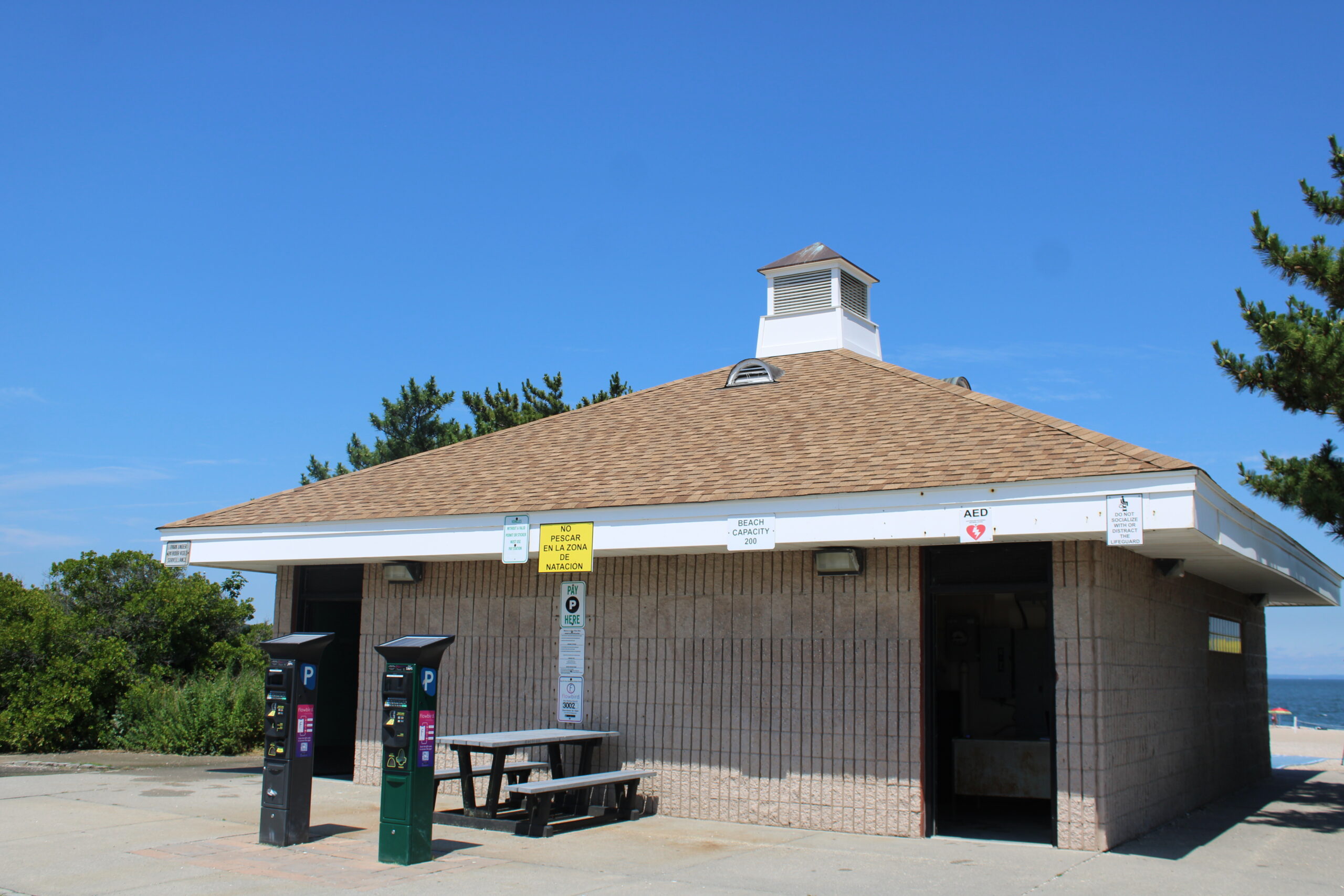As conversations of water quality treatment and available options remain eternal in Suffolk County, one of the Town’s north shore beaches is set to receive relatively new technology in the form of an Innovative Alternative Wastewater (I/A) System.
Cedar Beach West in Mount Sinai is slated to have construction begin after the summer and conclude by the end of the year.
An I/A system is capable of not only filtering wastewater faster than septic systems and can be built in areas near coastal waterways and closely above groundwater to avoid contamination from septic systems and cesspools, and can be installed on land not suitable for sewer infrastructure. I/A systems are also built with filters to sieve out harmful chemicals that would otherwise be distributed into the groundwater or the coastal waterways.

Suffolk County Executive Ed Romaine (R-Center Moriches) (pictured above) recently signed the landmark Suffolk County Water Quality Restoration Act to be put in front of voters in November as a ballot measure. If approved, the act would create a one-eighth-cent sales tax increase, in addition to the existing quarter-percent sales tax, to fund sewer and I/A systems across the county.
Suffolk County provided a $100,000 grant to the Town of Brookhaven through the Water Quality Protection and Restoration Program for the Cedar Beach West I/A system, with the Town of Brookhaven matching the funding per the initial grant application.
Executive Romaine was joined by Brookhaven Town Supervisor Dan Panico (R-Center Moriches) and Brookhaven Councilwoman Jane Bonner (R-Rocky Point) at Cedar Beach West on Thursday morning to unveil the announcement.
“I can’t emphasize enough the strong relationship we [the Town of Brookhaven] have with the County of Suffolk with County Executive Romaine now at the helm,” said Supervisor Panico. “The importance of dealing with sewage treatment can be seen over our shoulders. The Long Island Sound, like the Great South Bay and Moriches Bay, every year, has low-dissolved oxygen that is caused by nutrient pollution. The main nutrient is nitrogen, which comes out of the effluent, which causes algae and phytoplankton to bloom. When the algae and phytoplankton die, they go to the bottom of the Sound and are eaten by bacteria that also take up all of the oxygen in the water.”

Panico (pictured above) says that by moving forward away from traditional septic systems to I/A systems, the nitrogen is pulled out and “we put cleaner water into the Sound, preserve it for future generations, and help the immediate health of the fish, aquatic life, and the people of the Town of Brookhaven.”
“70% of Suffolk County is on cesspools; all of that leaches into the ground and affects our groundwater and surface water,” said Executive Romaine. “We have an opportunity here at a municipal facility where we can treat that with an alternative system and prevent a great deal of the nitrogen that would normally leach into the Long Island Sound.”
The Long Island Sound is a national estuary, one of about twenty-two in the country, with the Peconic Bay being another.
“We are going to protect the Sound. In the next four-to-five years, Suffolk County is going to be installing I/A systems throughout the county,” said Romaine. “We will also be spending up to half-a-billion dollars in the next few years on putting sewers in densely-populated communities. We are committed to preserving our environment and protecting our ground and surface water.”
Romaine added that he looks forward to working all ten of Suffolk’s townships, to put I/A systems and sewers “wherever we can” to “get off cesspools.”
“Many billions of dollars have been spent already on improving the health of the Long Island Sound, and this is another tool in the toolbox to improve the water quality of the Sound,” said Councilwoman Bonner. “It’s not just the Long Island Sound, but these I/A systems are crucial to protecting our drinking water. At some point, after you flush, it filters through to our sole-source aquifer. Thankfully, it takes hundreds of years to do so, but everything we can do at the outset to protect our water quality is something you can’t put a price on.”
Panico added that it was “fitting” to be joined by Romaine for the announcement, as Romaine started his career in the 1980s as a Suffolk County Legislator, where he wrote the county’s first clean water bill.
“Fast-forwarding many decades, here he is implementing the very beginnings of his career,” said Panico. “Because of his leadership, you [the public] have an opportunity to vote vis-a-vis a referendum for clean water this November. It’s crucially important for the future of Suffolk County, all of the towns, villages, and hamlets.”
Panico encouraged a “yes” vote on the ballot proposition, further elaborating that there is a “50-50” split between allocations for sewage treatment plants and I/A systems. He added that it was brought about through “compromise” and the “leadership of the County Executive.”
“It will have a lasting, meaningful effect long after we’re all gone,” added Panico.

Councilwoman Bonner (pictured above) made a “personal plea” to the residents: “Be careful about what you put on your lawn. It truly impacts our water quality and the ecosystems within the water.”
Bonner’s comment references certain pollutants that can damage the immediate environment and waterways, such as chemicals found in fertilizers and fuel from mowers and other appliances. The Potomac Conservancy recommends against over-fertilizing, as excess phosphorus cannot be absorbed by the grass, allowing it to be washed away by rain or sprinklers and running off into the waterways. Phosphorus is considered a superfood for algae, and in small doses, phosphorus can lead to oxygen imbalances in the water and cause algal blooms.
The Potomac Conservancy also recommends against bagging lawn clippings, as letting the nutrients absorb into the lawn not only promotes lawn health, but negates the need for additional fertilizer.







